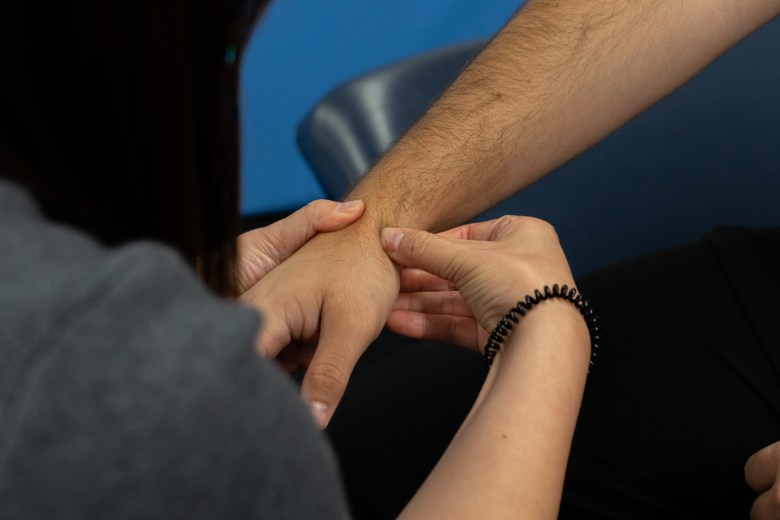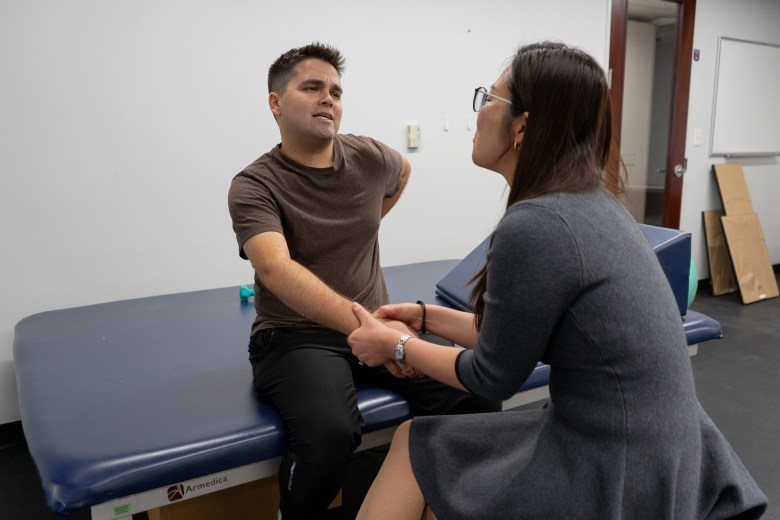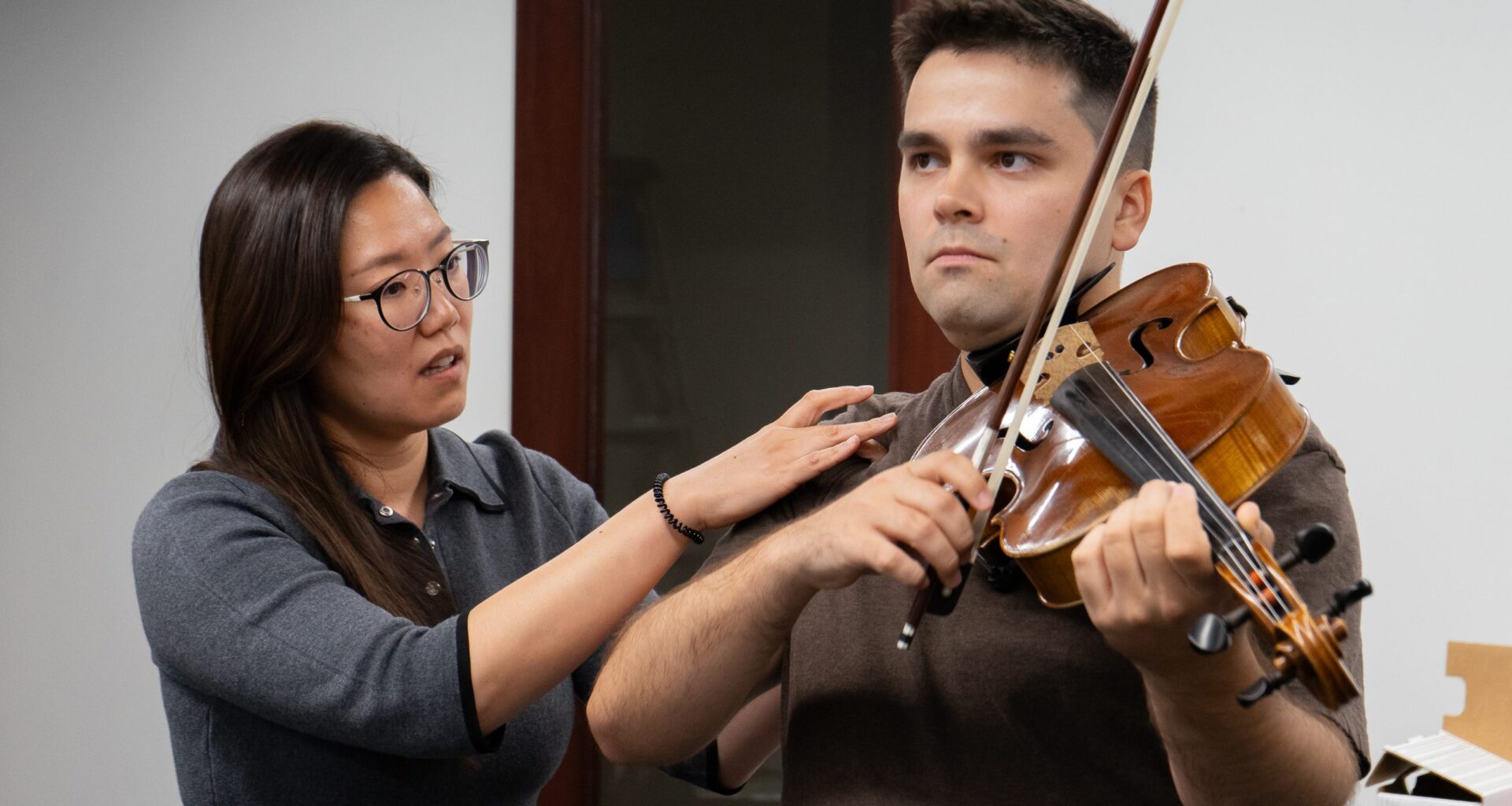Dr. Yein Lee pressed her fingers into a violinist’s right shoulder blade as he moved the bow across the strings.
Rayford James “RJ” McDowell had been experiencing pain in his upper pectoral muscle whenever he played his instrument. He met with Lee for the first time in late July hoping for treatment options that would minimize muscle imbalances.
“You do tense up a lot, definitely,” Lee said, as she watched McDowell firmly grip the bow.
She asked McDowell to put down his violin and then examined his arms, taking mental notes throughout the appointment. She suggested stretching exercises and adjusting his posture to maintain a straight back when performing.
An injection of Lidocaine — used by professional athletes and performers to manage pain — could be an option but unlikely to be needed now, she added.
 Dr. Yein Lee examines RJ McDowell’s wrist as she explains how violinists can often experience wrist pain due to the repetitive positions required while playing. (David Moreno | Fort Worth Report)
Dr. Yein Lee examines RJ McDowell’s wrist as she explains how violinists can often experience wrist pain due to the repetitive positions required while playing. (David Moreno | Fort Worth Report)
For McDowell, the recommendation was one he trusted, especially since he was receiving care from Performing Arts Medicine at UNT Health Fort Worth, a clinic specifically designed to treat artists like him.
Understanding performers’ needs
Performers face physical and emotional demands similar to professional athletes, often due to repetitive motion. However, their injuries often affect fine motor control, posture or breathing.
Performing Arts Medicine at UNT Health is the only center of its kind in North Texas that specializes in treating dancers, singers and musicians.
Established last year, it is an expansion of the Texas Center for Performing Arts Health that launched in 1999. The center was formed as a partnership between the University of North Texas’s College of Music and the Texas College of Osteopathic Medicine at UNT Health with a focus on educational programs and research.
The Performance Arts Medicine team provides preventive care, treats injuries and works to boost the overall performance of such artists across Tarrant County. The clinic is within the Department of Family and Osteopathic Manipulative Medicine at UNT Health.
The Fort Worth clinic oversees pain management and osteopathic manipulative treatment — a hands-on approach for easing musculoskeletal pain — for patients. The team develops return-to-stage recommendations, when a ballet dancer can go back into toe shoes, instrument-playing modification and practice suggestions.
Who can receive Performing Arts Medicine health care?
Self-pay performers and those with insurance can seek care on the sixth floor of the UNT Health Clinical Practice Group at 855 Montgomery St. in Fort Worth.
UNT Health also operates a grant-funded clinic to assist uninsured or underinsured performers. Because of limited funding, it operates only on Monday afternoons. To schedule an appointment, call 817-735-2455.
Dr. Sajid Surve, founder of Performing Arts Medicine, said the new division was formed to treat a “medically underserved community” that often avoids seeking health care for injuries.
“The culture of performing arts is to not talk about injuries and just let it fester because it puts your job, potentially, on the line if you talk about it,” he said. “A lot of our work has been about breaking down that stigma around seeking out health care.”
The clinic’s four physicians and specialists — who each practice their own forms of performing arts — understand the unique health needs of artists to provide focused therapy, Surve explained.
Lee, who is also a violinist and pianist, said people often use art to heal patients but not health care to treat artists.
The Fort Worth clinic partners with several arts organizations, including Texas Ballet Theater, Fort Worth Symphony Orchestra and The Cliburn, to provide care to their teams and conduct research. The division has had more than 750 patient encounters in the past year, according to UNT Health.
Forming deep connections with patients
Gabriela Alvarado Pasko is a flutist diagnosed with Ehlers-Danlos syndrome, a disorder that often leads to joint dislocations, stretchy skin and easy bruising.
For years, Pasko was advised by doctors to stop playing her instrument. That was not feasible given her career aspirations.
In 2017, Pasko connected with Lee at Performing Arts Medicine to focus on managing her disorder so she could continue to perform. She spent more than four years seeking care from the UNT Health clinic before relocating to the East Coast to grow her career.
“The clinic has been a treasure I wish I could take with me anywhere I go,” she said. “They’re so very dedicated to what they do, and (Lee) still reaches out to me. She’s going the extra mile to provide care that more of us need.”
Those deep connections with patients matter, Lee said.
 Dr. Yein Lee, right, examines RJ McDowell’s wrist as the violinist describes previous pains he’s had in his body from performing for long periods of time. (David Moreno | Fort Worth Report)
Dr. Yein Lee, right, examines RJ McDowell’s wrist as the violinist describes previous pains he’s had in his body from performing for long periods of time. (David Moreno | Fort Worth Report)
As Surve reflected on the first year of Performing Arts Medicine, he expressed pride in all his team accomplished but knows more opportunities to partner with other arts groups exist.
The most important aspect of the work, he said, is letting performers know help is available when they suffer for their art.
David Moreno is the arts and culture reporter for the Fort Worth Report. Contact him at david.moreno@fortworthreport.org or @davidmreports.
At the Fort Worth Report, news decisions are made independently of our board members and financial supporters. Read more about our editorial independence policy here.
Related
Fort Worth Report is certified by the Journalism Trust Initiative for adhering to standards for ethical journalism.
Republish This Story
Republishing is free for noncommercial entities. Commercial entities are prohibited without a licensing agreement. Contact us for details.
